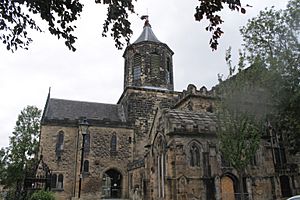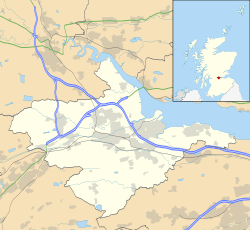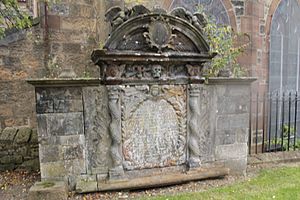Falkirk Old Parish Church facts for kids
Quick facts for kids Falkirk Old Parish Church |
|
|---|---|
| Falkirk Old & St. Modan's Parish Church | |

Falkirk Old Parish Church
|
|
| 56°00′01″N 3°47′09″W / 56.00028°N 3.78583°W | |
| OS grid reference | NS887800 |
| Location | Falkirk |
| Country | Scotland |
| Denomination | Church of Scotland |
| Website | www.foasmpc.org.uk |
| History | |
| Status | Parish church |
| Dedication | Saint Modan |
| Architecture | |
| Functional status | Active |
| Heritage designation | Category A listed building |
| Designated | 21 March 1960 |
Falkirk Old & St. Modan's Parish Church, also called "Falkirk Trinity Church", is a church in Falkirk, Scotland. It is part of the Church of Scotland. This old church is in the middle of Falkirk town. It might have started as early as the 600s.
Most of the church was rebuilt in the 1800s. However, its tall steeple from the 1700s was kept. The church building is very important. It is protected as a Category A listed building, meaning it has special historical value.
Contents
History of Falkirk Church
How the Church Began
The church was founded sometime after the 500s. It was known as the speckled church or Faw Kirk. The town of Falkirk gets its name from this church.
Some people say that King Malcolm Canmore also started a church here in 1057. In 1166, the church was given to Holyrood Abbey. The oldest parts of the church you see today are from around 1450. These parts show that the medieval church was shaped like a cross. It had a tower in the middle.
Building Changes Over Time
The church's tower was rebuilt between 1738 and 1741. This work was designed by a famous architect named William Adam. From the 1790s, people started suggesting that the church needed to be updated or made bigger. There were many disagreements about what to do.
In 1810, the problem went to a court called the Court of Session. The court decided that the old tower should stay. But the rest of the medieval building had to be pulled down and replaced. The plans by James Gillespie Graham were chosen. The building work was finished by autumn 1811. It cost about £3,500, which was a lot of money back then. A new room, called a session house, was added in 1893. It was designed by Wardrop & Anderson.
Joining Together
In 1986, the Old Parish Church joined with St Modan's Parish Church. This created the church congregation that exists today.
Inside the church, you can see some old carved stones from the medieval period. These include statues of important people. They used to be on top of tombs inside the old church. There is also a cross-head from the 1100s.
Important Burials at the Church
Many important people are buried in the churchyard. Here are some of the notable tombs:
- Sir John de Graeme: He was killed at the Battle of Falkirk on July 22, 1298. His gravestone has been replaced twice. The current stone is said to be a copy of the first one. It has an old poem written on it:
Here lyes Sir John the Grame, baith wight and wise,
Ane of the chiefs who rescewit Scotland thrise,
Ane better knight not to the world was lent,
Nor was gude Graham of truth and hardiment
This poem praises Sir John de Graeme as a brave and wise knight.
- Sir John Stewart of Bonkyll: He was also killed at the Battle of Falkirk in 1298. Sir John Stewart was a direct ancestor of James VI of Scotland. This means he is also an ancestor of the current Royal Family of the United Kingdom.
- Patrick Murehead of Rashyhill (died 1723)
- Sir Robert Munro, 6th Baronet (died 1746)
 | Selma Burke |
 | Pauline Powell Burns |
 | Frederick J. Brown |
 | Robert Blackburn |



